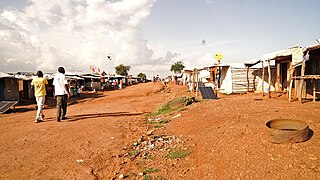Related Research Articles

Adjumani District is a district in Northern Uganda. Like most other Ugandan districts, it is named after its 'chief town', Adjumani, where the district headquarters are located.
Kiryandongo Refugee Settlement is a refugee camp in Bweyale in Kiryandongo district Uganda.
South Sudanese refugees are persons originating from the African country of South Sudan, but seeking refuge outside the borders of their native country. The world's youngest independent country has a recent and troubled history of prolonged conflicts and ecosystem mismanagement such as overlogging, which has led to desertification. These forces have resulted not only in violence and famine, but also the forced migration of large numbers of the population, both inside and outside the country's borders. South Sudan was cited as the largest refugee crisis in 2016, being the world's third largest, followed by Syria and Afghanistan. As of 2022, the UNHCR estimated that there were 2.4 million refugees under its mandate originating from South Sudan, making the country the fifth largest source of refugees.

Rhino Camp Refugee Settlement is a refugee camp located in the districts of Madi-Okollo and Terego District in North Western Uganda.
Pagirinya Refugee Settlement is a refugee camp in Eastern Adjumani District in Northern Uganda.

Bidibidi Refugee Settlement is a refugee camp in the Yumbe District of northwestern Uganda. Home to over 270,000 South Sudanese refugees fleeing the ongoing civil war in early 2017, it was among the largest refugee settlements in the world at the time, and may have been the largest. As of 2018, that distinction was claimed by Kutupalong refugee camp for displaced Rohingya in Bangladesh.
Nyumanzi Refugee Settlement is a refugee camp in Adjumani District in northwestern Uganda. Established in 2014, it hosts about 52,000 South Sudanese refugees.
The Palorinya Refugee Settlement is a refugee camp in the Moyo District of the Northern Region of Uganda. The majority of the population fled the civil crisis in South Sudan in 2016.
Oruchinga Refugee Settlement is a refugee camp in Isingiro District in Southern Uganda.
The Elema Refugee Settlement is a refugee settlement in Adjumani district, westnile sub-region of Uganda. Elema was established in 1992 and stands to be the oldest refugee settlement out of the total of nine settlement in Adjumani district. The settlement is composed entirely of refugees from the Kuku tribe of South Sudan. The Kuku speak a Bari dialect, also called Kuku. They are chiefly a farming people relying on mixed farming. Following a UNHCR-led repatriation of South Sudanese refugees in 2008 from Uganda, the Kuku ethnic group in Elema declined to be repatriated.
Baratuku refugee settlement is a refugee settlement in Adjumani district Uganda
Mungula II Refugee Settlement is a refugee camp found in Adjumani District Itirikwa subcounty in Northern Uganda.
Olua I Refugee settlement is a refugee camp in eastern Adjumani District in Northern Uganda. The Refugee settlement has its primary country as Uganda and other country south Sudan.
Mungula refugee settlement is located in Adjumani district in northern Uganda on the border with South Sudan.
Mirieyi refugee settlement is a refugee camp in Ofua Sub County in the Adjumani District of Uganda.

Boroli refugee settlement is a refugee camp located in the Pakele Sub County of Adjumani District Northern Region, of Uganda.
Ayilo 2 refugee settlement is one of the refugee camps in Adjumani District in the Northern Region of Uganda.

The Maaji refugee settlements are three refugee camps located in Adjumani District in the Northern Region of Uganda, established in 1997. In June 2018, there were 41,764 registered refugees, accounting for 10% of the district's total population. It has primarily admitted refugees from the Second Sudanese Civil War and the ongoing South Sudanese Civil War. The settlements have been attacked several times by the Lord's Resistance Army, along with other camps in the region such as the Baratuku refugee settlement.
Rhino Camp Extension Refugee settlement is a refugee camp located in Omugo Zone in Arua District in Uganda. It is also known as Rhino Refugee camp - Omugo zone Extension. It hosts over 43,000 refugees. It is located next to the Imvepi Refugee Settlement.
Ayilo 1 refugee settlement is a prominent refugee camp located in Adjumani District, situated in the Northern Region of Uganda.
References
- ↑ "Uganda Refugee Response Monitoring Settlement Fact Sheet: Oliji (June 2018) - Uganda". ReliefWeb. Retrieved 2020-09-28.
- ↑ "South Sudanese grow rice, and community ties, in Uganda". UNHCR Canada. 2019-04-18. Retrieved 2020-09-28.
- ↑ "Uganda Refugee Response Monitoring Settlement Fact Sheet: Oliji (June 2018) - Uganda". ReliefWeb. Retrieved 2020-09-28.